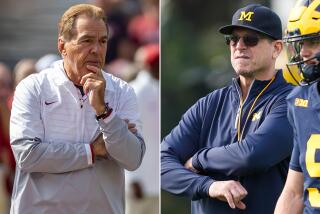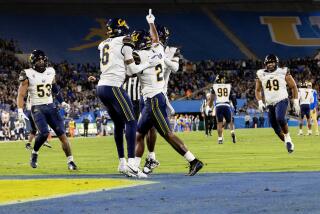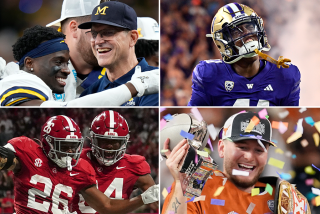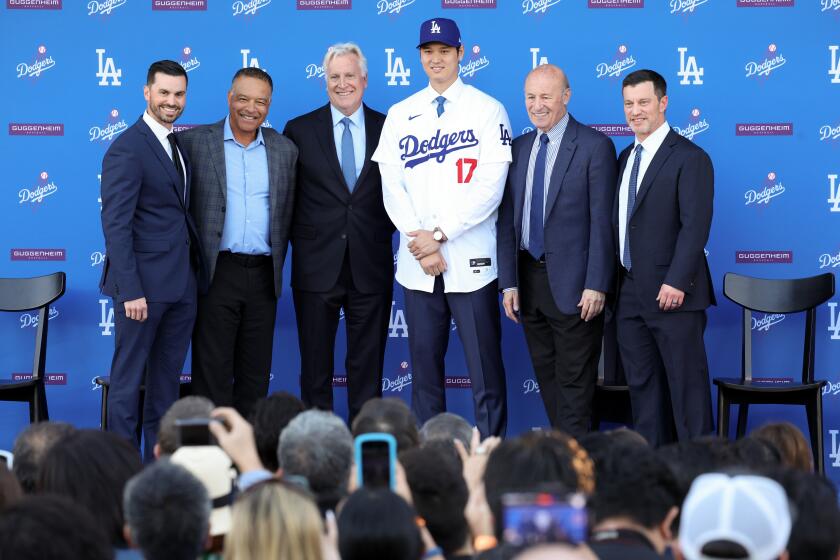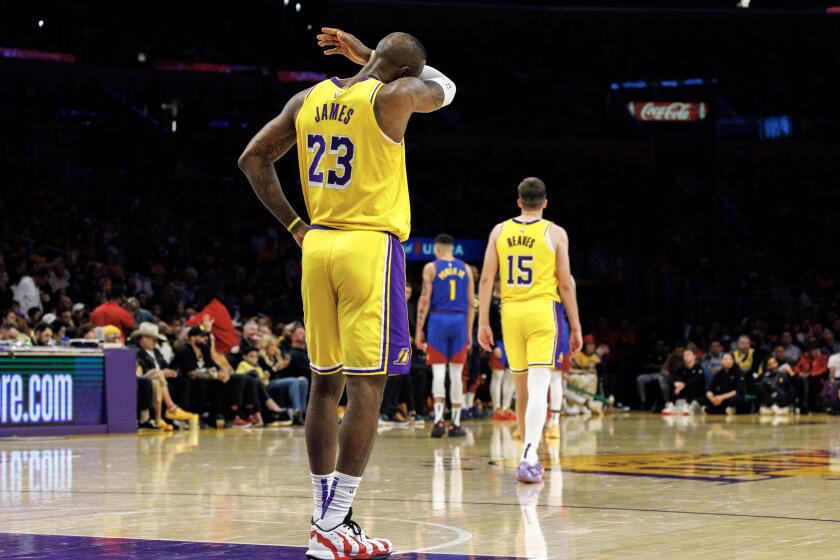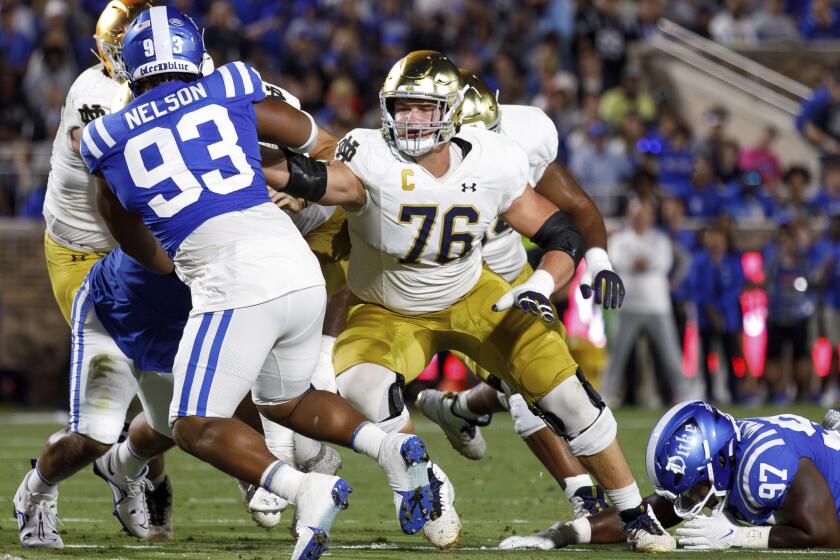Social media was the game-changer in Missouri football team revolt
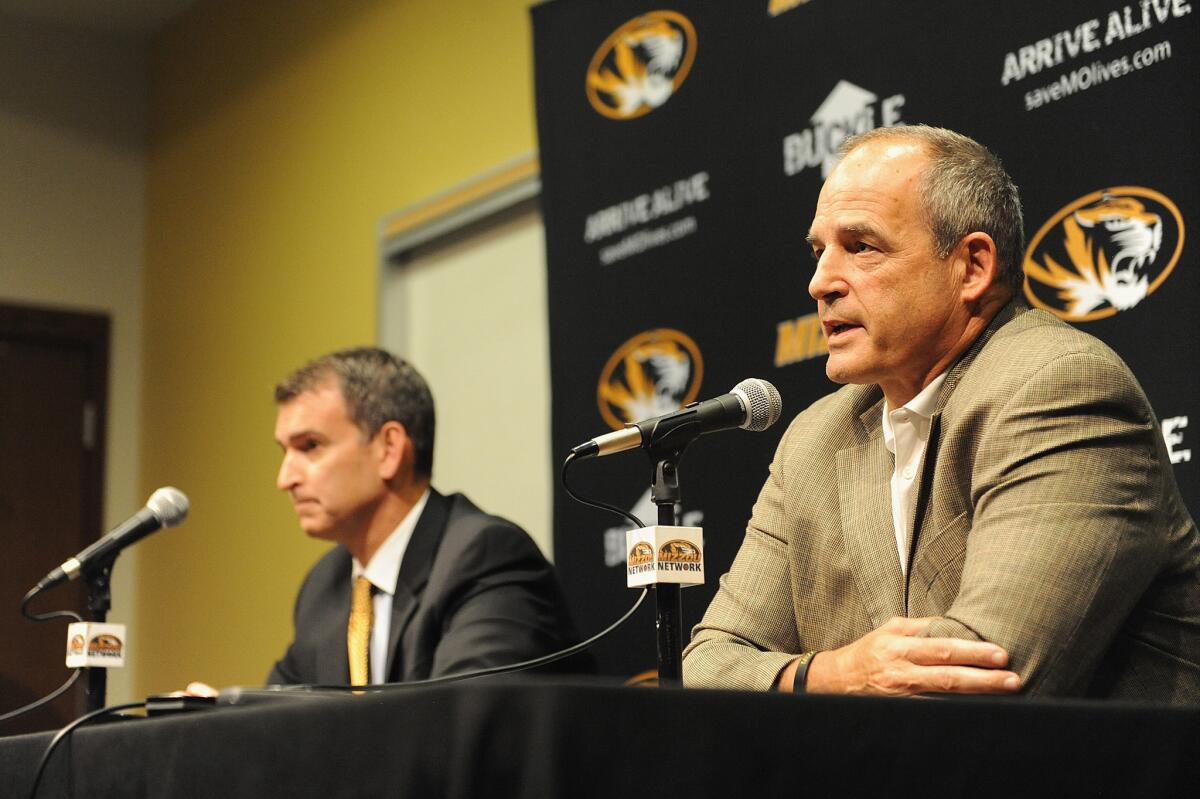
The support of Missouri Coach Gary Pinkel, right, helped bolster his players’ attempts to enact change. It was a stark contrast to a similar situation at Wyoming in 1969.
The power of big-time, big-money, modern-day college football cannot be underestimated. That was clearly revealed Monday, when the banding together of Missouri’s team — and subsequent threat of a game boycott — led to the resignation of the university’s president.
As tensions teemed over the handling of racial issues on campus, the mere threat of not playing a football game changed the dynamic overnight.
Kurt Kemper, a history professor at Dakota State, e-mailed me Sunday night as the situation was unfolding.
“Does anyone else note the tremendous coincidence that Missouri’s next opponent will be BYU?” Kemper asked.
He was right. It was quite a coincidence.
In October of 1969, Brigham Young had a game scheduled against Wyoming in Laramie, Wyo. On the eve of the game, Wyoming Coach Lloyd Eaton kicked 14 players — all black — off the team.
His reason: The players had threatened to wear arm bands in protest of the LDS Church for its refusal to let black males serve in the priesthood.
The game was played as scheduled and Wyoming won, 40-7, but the incident ruined the Cowboys’ program for years.
“If you were black, why would you go there?” Kemper said in a phone interview on Monday. “They became god-awful. It killed them in recruiting.”
Wyoming, beginning in 1970, had six straight losing seasons.
Kemper noted the contrast between then and now.
In 1969, many people sided with Wyoming’s coach. “The culture has changed,” Kemper said. “We no longer tolerate authoritarian coaches like we did in the ‘60s.”
Technology and economics also played a huge role in settling the Missouri situation.
News of the Missouri revolt spread instantly on social media. At stake was more than $1 million in revenue had the BYU game not been played.
“Presidents and athletic directors love the revenue that football brings but don’t often think that it’s a double-edged sword,” Kemper said. “Sometimes you can put a leash on the beast, but sometimes the beast turns around and eats you.”
The game-changer in the Missouri conflict was a message Gary Pinkel, Missouri’s football coach, delivered over Twitter. It read in part: “The Missouri Family stands as one.”
Pinkel sided with his players and, within hours, the controversy was muted. “It certainly didn’t look good for the president once Pinkel came out,” Kemper said.
Last March, Oklahoma Coach Bob Stoops stood arm-in-arm with his players, and even canceled spring practice sessions, to protest a racist video involving an on-campus fraternity.
The players, in a statement, thanked Stoops for his support. Oklahoma is 8-1 this week as it prepares for Baylor.
The landscape is radically different than it was in 1969.
“Our willingness to see larger context in sports is now more sophisticated,” Kemper said. “In the ‘60s there were very few public commentators. We often didn’t see the larger issues.”
Kemper is an avid college football fan, and author of books on collegiate sports, culture and race. He earned his doctorate from football-crazed Louisiana State, receiving his diploma by hand from then-LSU president Mark Emmert, who now leads the NCAA.
Growing up in Culver City, Kemper read Los Angeles Times sports columnist Jim Murray, whom he credits for being one of the few national voices in the 1960s to take on social issues. Murray wasn’t afraid to chide sacred sporting icons such as the Augusta National Golf Club, host of the Masters, over racial discrimination.
“Almost no one was willing to make those decisions,” Kemper recalled. “It offended some that he had the nerve to oppose them in the sports pages.”
There are more voices now. They are louder and ping off circling satellites. They emanate from portals and devices that were inconceivable in 1969.
“In terms of electronics and social media,” Kemper said, “it’s the ability to get thousands of people paying attention to you.”
It’s too late to help the Wyoming 14. But the times, they did change, in time to help Missouri.
MORE ON THE UNIVERSITY OF MISSOURI
Video captures Missouri protesters’ clash with media
Protesters celebrate after top University of Missouri leaders resign over racial turmoil
University of Missouri football team and coach join protest to oust university leader
More to Read
Get our high school sports newsletter
Prep Rally is devoted to the SoCal high school sports experience, bringing you scores, stories and a behind-the-scenes look at what makes prep sports so popular.
You may occasionally receive promotional content from the Los Angeles Times.
